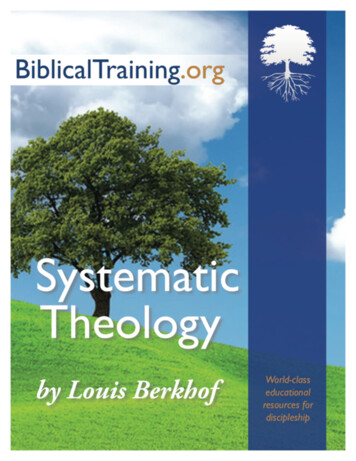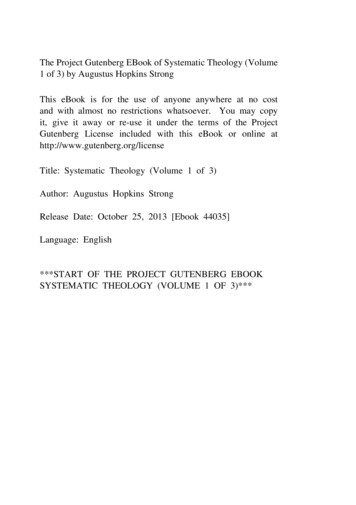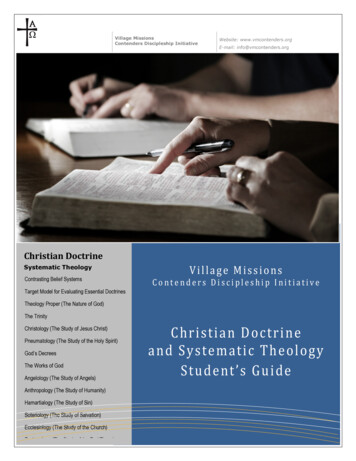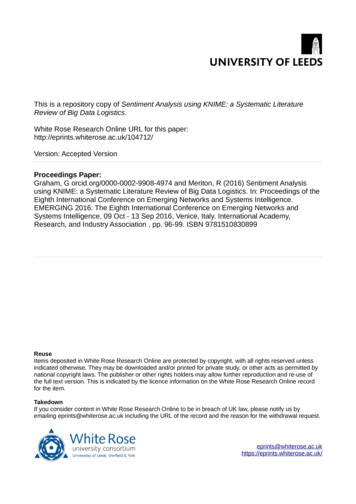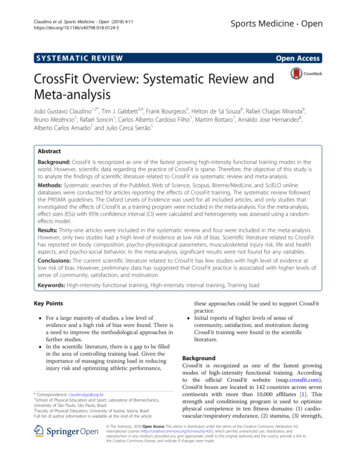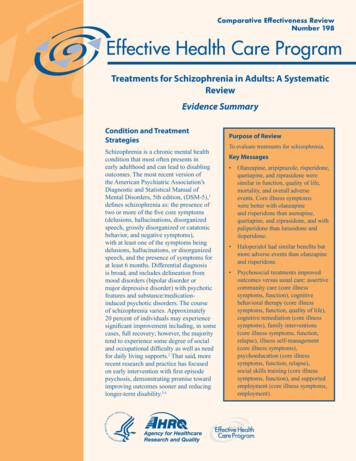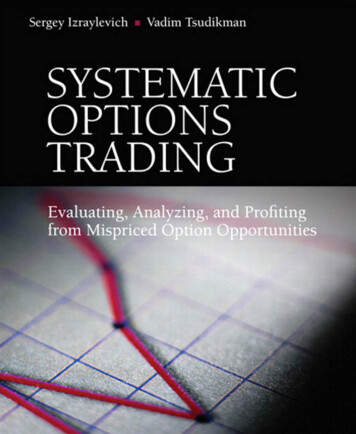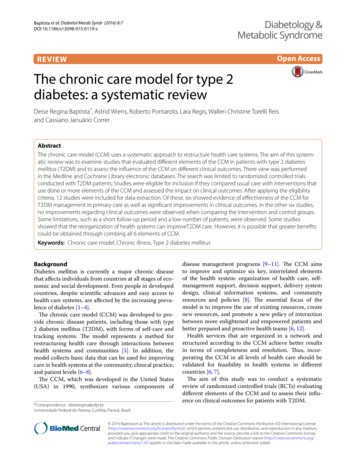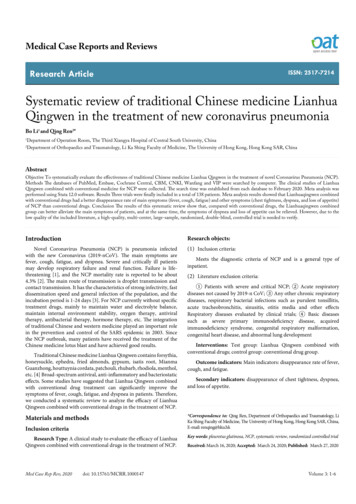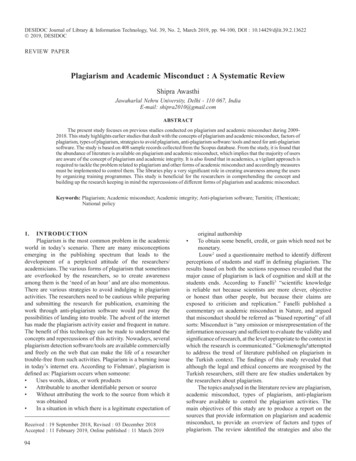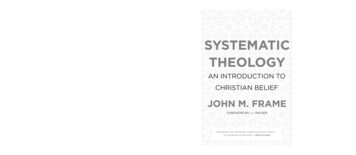
Transcription
7.125 10.25 SPINE: 2.5“It is a special joy to see this, thequintessence of a lifetime of Frame’sstudy of God’s Word.”—Walter C. Kaiser Jr., PresidentEmeritus, Gordon-Conwell TheologicalSeminary“This major work maintains Frame’sreputation for impeccable scholarshipon the one hand and eminentpracticality on the other.”—Eugene H. Merrill, DistinguishedProfessor of Old Testament Studies,Dallas Theological Seminary“John Frame is one of the most seminalReformed theologians of our age, andthis is his most significant work.”—Mark Driscoll, Founder, theResurgence; Cofounder, Acts 29John M. Frame (A.B., Princeton University;B.D., Westminster Theological Seminary; M.A.and M.Phil., Yale University; D.D., BellhavenCollege) holds the J. D. Trimble Chair ofSystematic Theology and Philosophy atReformed Theological Seminary in Orlandoand is the author of many books, includingthe four-volume Theology of Lordship series.“Few in our day champion a vision of God as massive, magnificent, andbiblical as John Frame’s. For decades, he has given himself to the church, tohis students, and to meticulous thinking and the rigorous study of the Bible.He has winsomely, patiently, and persuasively contended for the gospel in thesecular philosophical arena, as well as in the thick of the church worship warsand wrestlings with feminism and open theism. He brings together a rare blendof big-picture thinking, levelheaded reflection, biblical fidelity, a love for thegospel and the church, and the ability to write with care and clarity.”—John Piper, Chancellor, Bethlehem College and Seminary; Founder andTeacher, www.desiringGod.org“Systematic Theology . . . is a worthy climax to the life’s work of one who hasonly ever sought to be a faithful servant of Christ, teaching in his church. It isa privilege to celebrate its appearing and to commend it for serious study. Iguarantee that the dividends of such study will be uniformly high. Thank you,John Frame, for this superb gift.”—J. I. Packer, Board of Governors’ Professor of Theology, Regent College“This new systematic theology comes from one of the great theologicalminds of our age. John Frame’s contributions to theology are already massiveand many, but now he has given the church a systematic theology. This is avery important book, and it represents a lifetime of consecrated theologicalreflection. This new volume promises to be an enduring contribution toevangelical theology.”—R. Albert Mohler Jr., President, The Southern Baptist Theological Seminary“John Frame is one of my favorite theologians, and his Systematic Theology isfilled with the deep learning and warranted wisdom of a lifetime. I commend itwarmly to the Lord’s people everywhere.”—Timothy George, Founding Dean, Beeson Divinity School of SamfordUniversity; General Editor, Reformation Commentary on ScriptureSYSTEMATICTHEOLOGYSYSTEMATICTHEOLOGYAN INTRODUCTION TOCHRISTIAN BELIEFJOHN M. FRAMEFOREWORD BY J. I. PACKERFRAME“Wonderfully clear, refreshingly insightful, profoundly biblical. . . .SYSTEMATIC THEOLOGYEANwww.prpbooks.comCover design by Tobias’ Outerwear for BooksImage nanamee.com / TrikonaSA biblical, clear, cogent, accessible,comprehensive, and practical summary ofChristian belief by one of the most importantand original American theologians of the lasthundred years.AN INTRODUCTION TO CHRISTIAN BELIEF“Here, at last, is John Frame’s magnumopus. . . . Few other contemporarytheologians have influenced me as muchas Dr. Frame.”—Justin Taylor, Blogger, “Between TwoWorlds”FLAPS: 3.5ISBN: 978-1-59638-217-69 781596 382176An outstanding achievement!” —Wayne Grudem54999ystematic Theology is theculmination and creativesynthesis of John Frame’swriting on, teaching about,and studying of the Word of God. Thismagisterial opus—at once biblical,clear, cogent, readable, accessible,and practical—summarizes the maturethought of one of the most importantand original Reformed theologians ofthe last hundred years. It will enable youto see clearly how the Bible explainsGod’s great, sweeping plan for mankind.“John M. Frame’s Systematic Theologyis a remarkable achievement. It issimultaneously scholarly yet accessible,sweeping in scope but penetrating ininsight, steeped in historic orthodoxyyet fresh in reflection.”—Peter A. Lillback, President,Westminster Theological Seminary“The biblical and practical nature of hisperspective makes this a refreshing andmuch-needed resource for all of us whocare about a vital Reformed theology.”—Richard J. Mouw, President, FullerTheological Seminary“Frame has produced what shouldbecome required reading in seminaryclassrooms and pastors’ studies foryears to come.”—Mark Young, President, DenverSeminary“Clear, thorough, intelligent, and fair toopposing views, John Frame’s work willnow be the standard within traditionalReformed theology.”—Cornelius Plantinga Jr., President,Calvin Theological Seminary
The following chapters are included in this excerpt of John Frame’s SystematicTheology: An Introduction to Christian Belief:!!1. What is Theology?4. The Lord's Covenants5. The Kingdom of God6. The Family of God11. The Acts of the Lord: God's Decrees16. God's Attributes: Power, Will17. God's Attributes: Lord of Time29. God and Our Knowledge30. Perspectives on Human Knowledge31. Justifying Claims to Knowledge32. Resources for Knowing52. How Then Shall We Live?To purchase the entire work, please visit the Presbyterian & Reformed Publishingwebsite here.
SystematicTheologyAn Introduction toChristian BeliefJohn M. FrameFrame Systematic Theology.indd 39/25/13 2:15 PM
2013 by John M. FrameAll rights reserved. No part of this book may be reproduced, stored in a retrieval system, or transmittedin any form or by any means—electronic, mechanical, photocopy, recording, or otherwise—except forbrief quotations for the purpose of review or comment, without the prior permission of the publisher,P&R Publishing Company, P.O. Box 817, Phillipsburg, New Jersey 08865–0817.Unless otherwise indicated, Scripture quotations are from The Holy Bible, English Standard Version,copyright 2007 by Crossway Bibles, a division of Good News Publishers. Used by permission. Allrights reserved.Printed in the United States of AmericaISBN: 978-1-59638-217-6 (cloth)ISBN: 978-1-59638-821-5 (ePub)ISBN: 978-1-59638-822-2 (Mobi)Library of Congress Cataloging-in-Publication DataFrame, John M., 1939Systematic theology : an introduction to Christian belief / John M. Frame.pages cmIncludes bibliographical references and index.ISBN 978-1-59638-217-6 (cloth)1. Theology, Doctrinal. I. Title.BT75.3.F73 2013230’.42--dc232013023759Frame Systematic Theology.indd 49/25/13 2:15 PM
To the Next caAnd those yet unbornAnd to CarolNKwagala nnyo!Frame Systematic Theology.indd 59/25/13 2:15 PM
STHCInstitutesJohn M. Frame, Apologetics to the Glory of God (Phillipsburg, NJ: P&RPublishing, 1994)American Standard VersionHerman Bavinck, Reformed Dogmatics, 4 vols. (Grand Rapids: Baker,2003–8)Karl Barth, Church Dogmatics, 4 vols. (Edinburgh: T. and T. Clark,1936–62)Calvin Theological JournalJohn M. Frame, Cornelius Van Til: An Analysis of His Thought (Phillipsburg, NJ: P&R Publishing, 1995)John M. Frame, Contemporary Worship Music: A Biblical Defense (Phillipsburg, NJ: P&R Publishing, 1997)John M. Frame, The Doctrine of the Christian Life (Phillipsburg, NJ: P&RPublishing, 2008)John M. Frame, The Doctrine of God (Phillipsburg, NJ: P&R Publishing,2002)John M. Frame, The Doctrine of the Knowledge of God (Phillipsburg, NJ:P&R Publishing, 1987)John M. Frame, The Doctrine of the Word of God (Phillipsburg, NJ: P&RPublishing, 2010)John M. Frame, Evangelical Reunion: Denominations and the One Bodyof Christ (Grand Rapids: Baker, 1991); available at http://www.frame-poythress.org; http://www.evangelicalreunion.orgEnglish Standard VersionWayne Grudem, Systematic Theology (Grand Rapids: Zondervan, 1994)Heidelberg CatechismJohn Calvin, Institutes of the Christian ReligionxxxiiiFrame Systematic Theology.indd 339/25/13 2:15 PM
GNTOTPPPWGRDrsvSBLSCGSTWCFWSTWTJFrame Systematic Theology.indd 34John M. Frame, “Introduction to the Reformed Faith,” available athttp://www.frame-poythress.orgJournal of the Evangelical Theological SocietyKing James VersionThe Septuagint, early Greek translation of the OT, sometimes quotedin the NTCollected Writings of John Murray, 4 vols. (Edinburgh: Banner of Truth,1977)New American Standard BibleNew English BibleNew International VersionNew King James VersionJohn M. Frame, No Other God (Phillipsburg, NJ: P&R Publishing, 2001)New TestamentOld TestamentJohn M. Frame, “A Primer on Perspectivalism,” available at http://www.frame-poythress.orgJohn M. Frame, Perspectives on the Word of God (Eugene, OR: Wipf andStock, 2000)Heinrich Heppe, Reformed Dogmatics (Grand Rapids: Baker, 1950, 1978)Revised Standard VersionJohn M. Frame, Salvation Belongs to the Lord: An Introduction to SystematicTheology (Phillipsburg, NJ: P&R Publishing, 2006)Thomas Aquinas, Summa contra GentilesThomas Aquinas, Summa TheologiaeWestminster Confession of Faith (Atlanta: Committee for ChristianEducation and Publications, Presbyterian Church in America, 1986);published together with the Westminster Larger Catechism (WLC),the Westminster Shorter Catechism (WSC), and proof textsJohn M. Frame, Worship in Spirit and Truth (Phillipsburg, NJ: P&RPublishing, 1996)Westminster Theological Journal9/25/13 2:15 PM
c h a p t e r1What Is Theology?T H EOL O G Y I S F U L L of definitions of things. One of the useful features of asystematic theology is that you can turn there and get quick definitions of terms suchas justification, glorification, or hypostatic union. Definitions are useful, but we shouldbe warned that they are rarely, if ever, found in Scripture itself.1 Such definitions arethemselves theology in that they are the work of human beings trying to understandScripture. This work is fallible, and theological definitions are almost never adequatein themselves to describe the complex ways in which language is used in the Bible.For example, when John speaks of those who “believed” in Jesus in John 8:31, he is notusing the term in any of the classical theological definitions of belief or faith. You cantell, because in verse 44 Jesus tells them, “You are of your father the devil, and yourwill is to do your father’s desires.”This reminder is especially appropriate when we are defining terms that are notexplicitly found in Scripture itself. Theology itself is one of these. Theologians havedeveloped a number of terms and concepts that are absent from Scripture itself, suchas Trinity, substance, person, nature, aseity, inerrancy, effectual calling. There is nothingwrong with inventing new terms in order to better communicate biblical teaching.Indeed, this happens on a grand scale whenever the Bible is translated into a newlanguage. When people first translated the Bible into French, German, English, andother languages, each time they had to come up with a whole set of new terms foreverything in the Bible. From this fact, we can see that the line between translationand theology is not sharp.Theologians came up with the term effectual calling to distinguish one biblical useof the term calling from others. Effectual calling is God’s sovereign summons thatactually draws a person into union with Christ. But this is not the only kind of calling mentioned in Scripture. Calling can also refer to a name-giving, or an invitation,or a request for someone’s attention. So the term effectual calling isolates a particular1. A few Bible passages come close to defining something, such as 1 John 3:4 (sin); 1 John 4:10 (God’s love). Butare these definitions, or only contextually significant descriptions? Of course, the precise distinction betweendefinition and description is not always clear.3Frame Systematic Theology.indd 39/25/13 2:15 PM
4INTRODUCTION TO SYSTEMATIC THEOLOGYbiblical concept, distinguishing it from others. We see again, then, how making adefinition is itself a theological task. It can help us to understand something of theteaching of Scripture.Definitions, then, can be helpful teaching tools. But we should not look at themto find what something “really is,” as though a definition gave us unique insight intothe nature of something beyond what we could find in the Bible itself. A theologicaldefinition of omniscience doesn’t tell you what omniscience really is, as if the biblical descriptions of God’s knowledge were somehow inadequate, even misleading oruntrue. Even though there are none to few definitions in the Bible, Scripture, not anytheological definition, is our ultimate authority. Theological definitions must measureup to Scripture, not the other way around.Nor should we assume that there is only one possible definition of something. Sin canbe defined as (1) transgression of God’s law or as (2) rebellion against God’s lordship.Other definitions, too, may be possible, but let’s just consider these. Of course, if youdefine sin as transgression of God’s law, you may well need to make it clear that suchtransgression constitutes rebellion. And if you define it as rebellion, eventually youwill probably need to say that the rebellion in question is a rejection of a divine law.You may use either definition as long as you understand that each implies the other.You may choose either one as your definition, as long as you recognize the other asa description.So of course, definitions are not something to live or die for. We should seekto understand the definitions of various writers, recognizing that someone whouses a different definition from ours might not differ with us at all on the substantive doctrine.Long and Short DefinitionsTheologians often prefer very long definitions. One of Karl Barth’s definitions oftheology is an example:Theology is science seeking the knowledge of the Word of God spoken in God’swork—science learning in the school of the Holy Scripture, which witnesses to theWord of God; science labouring in the quest for truth, which is inescapably requiredof the community that is called by the Word of God.2Here Barth tries to bring a large amount of theological content into his definition. Thisattempt is understandable, since every theologian wants his concept of theology to begoverned by the content of theology. So he tries to show how the very definition oftheology reflects the nature of the gospel, the content of Scripture, the preeminenceof Christ, the nature of redemption, and so on.2. Karl Barth, Evangelical Theology: An Introduction (Grand Rapids: Eerdmans, 1963), 49–50. He uses a somewhatshorter definition in CD for the related concept dogmatics: “As a theological discipline dogmatics is the scientificself-examination of the Christian Church with respect to the content of its distinctive talk about God.” CD, 1.1:4.Frame Systematic Theology.indd 49/25/13 2:15 PM
1: What Is Theology?5I think this is a mistake. In his Semantics of Biblical Language,3 James Barr warnedbiblical scholars of the fallacy of supposing that the meanings of biblical terms wereloaded with theological content. The meaning of Scripture comes not from its individualterms, but from its sentences, paragraphs, books, and larger units. For example, theword created, just by itself, out of all context, teaches us nothing. But “In the beginning,God created the heavens and the earth” (Gen. 1:1) teaches us a great deal. “By him allthings were created” (Col. 1:16) teaches us even more.The same warning is appropriate for theologians. Certainly our theological methodsand conclusions must be derived from God’s revelation. But our definition of the wordtheology need not recapitulate those conclusions, though it must certainly be consistentwith its conclusions. That is, the definition of theology cannot be a condensation of all thecontent of the Scriptures. Yet it must describe an activity that the Scriptures warrant.Theology as ApplicationLet us then attempt to develop a concept or definition of theology.4 The basic ideaof theology is evident in the etymology of the term: a study of God. But we shouldseek a more precise definition.As I will argue in chapters 23–28, in Christianity the study of God is a study of God’srevelation of himself. Natural revelation and word revelation illumine one another.Scripture (our currently available form of word revelation) is crucial to the task oftheology because as a source of divine words it is sufficient for human life (2 Tim.3:16–17), and it has a kind of clarity not found in natural revelation. But natural revelation is a necessary means of interpreting Scripture. To properly understand Scripture,we need to know something about ancient languages and culture, and that information is not always available in Scripture alone. Nevertheless, once we have reached asettled interpretation as to what Scripture says, that knowledge takes precedence overany ideas supposedly derived from natural revelation.So theology must be essentially a study of Scripture. It should not be defined asan analysis of human religious consciousness or feelings, as in the view of FriedrichSchleiermacher.5 But we need to ask how theology is to study Scripture. Theology is notinterested in finding the middle word in the Hebrew text of Ecclesiastes, for example.Charles Hodge saw theology as a science that dealt with the facts of Scripture, asan astronomer deals with facts about the heavenly bodies or a geologist deals withfacts about rocks. He said that theology “is the exhibition of the facts of Scripture intheir proper order and relation, with the principles or general truths involved in thefacts themselves, and which pervade and harmonize the whole.”6 If Schleiermacher’sconcept of theology is subjectivist, Hodge’s might be called objectivist. Schleiermacher3. James Barr, Semantics of Biblical Language (London: Oxford University Press, 1961), 129–40, 246–96.4. In all the discussion below, it should be evident that the term theology refers both to the activity of seekingknowledge and to the texts in which that knowledge is recorded.5. Friedrich Schleiermacher, The Christian Faith (New York: Harper, 1963).6. Charles Hodge, Systematic Theology (Grand Rapids: Eerdmans, 1952), 1:19.Frame Systematic Theology.indd 59/25/13 2:15 PM
6INTRODUCTION TO SYSTEMATIC THEOLOGYlooked inward, Hodge outward. Schleiermacher looked primarily at subjective feelings, Hodge at objective facts. To Hodge, theology seeks the objective truth about Godthrough Scripture. He wants the “facts” and the “truths.”Certainly Hodge’s definition of theology is better than Schleiermacher’s, becauseHodge’s is Bible-centered. But Hodge, like many orthodox evangelical theologians,leaves us confused about an important question: why do we need theology when wehave Scripture?Scripture itself, given Hodge’s own view of Scripture, tells us objective truth aboutGod. We don’t need a theological science to give us that truth. So what is the role oftheology?In the statement quoted above, Hodge says that theology is an “exhibition ofthe facts of Scripture.” But aren’t the facts of Scripture already exhibited in thebiblical text itself?He further says that theology exhibits these facts “in their proper order and relation.” This sounds a bit as though the order and relation of the facts in Scripture itselfare somehow improper, and that theology has to put them back where they belong.People sometimes talk about the theological “system” of biblical doctrine as if thatsystem stated the truth in a better way than Scripture itself, or even as if that systemwere the real meaning of Scripture hidden beneath all the stories, psalms, wisdomsayings, and so on. I don’t think Hodge had anything like this in mind; such ideas areinconsistent with Hodge’s high view of Scripture. But his phrase “proper order andrelation” doesn’t guard well against such notions. And in any case, it leaves unclearthe relation between theology and Scripture.He continues by saying that theology, together with its work of putting the factsof Scripture into proper order and relation, seeks to state “the principles or general truths involved in the facts themselves, and which pervade and harmonize thewhole.” Certainly this is one of the things that theologians do, and ought to do. Butagain we ask: hasn’t Scripture done this already? And if it has, then what is left fortheology to do?In seeking a definition of theology, we need to emphasize not only its continuitywith Scripture, but its discontinuity, too. The former is not difficult for orthodoxProtestants: theology must be in accord with Scripture. But the latter is more difficult to formulate. Obviously, theology is something different from Scripture. Itdoesn’t just repeat the words of Scripture. So the main question about theology isthis: what is the difference between theology and Scripture, and how can that difference be justified?Evidently the theologian restates the facts and general truths of Scripture, for somepurpose. But for what purpose? Hodge does not tell us.In my view, the only possible answer is this: the theologian states the facts and truthsof Scripture for the purpose of edification. Those truths are stated not for their ownsake, but to build up people in Christian faith.Frame Systematic Theology.indd 69/25/13 2:15 PM
1: What Is Theology?7In this way, we align the concept of theology with the concepts of teaching andpreaching in the NT. The terms for teaching—didasko, didache, and didaskalia7—refernot to the stating of objective truth for its own sake, but to the exposition of God’struth in order to build up God’s people. Consider Acts 2:42; 1 Cor. 14:6; 1 Tim. 1:10;2:7; 4:6, 16; 6:3–4; 2 Tim. 4:2; Titus 1:9; 2 John 9. These passages contain words of thedidasko group, translated “teacher,” “teaching,” “doctrine.” Notice the frequent emphasis in these passages that teaching has the purpose of building people up in faith andobedience to God. Notice also the phrase sound doctrine, in which sound is hygiainos,“health-giving.” The purpose of teaching is not merely to state the objective truth, butto bring the people to a state of spiritual health.In defining theology, it is not strictly necessary to align it with a single biblical term,but it is certainly an advantage when we can do this. I propose that we define theologyas synonymous with the biblical concept of teaching, with all its emphasis on edification.So theology is not subjective in Schleiermacher’s sense, but it has a subjective thrust. Weneed theology in addition to Scripture because God has authorized teaching in the church,and because we need that teaching to mature in the faith. Why did Hodge not state this as thereason we need theology? Perhaps he wanted to encourage respect for academic theologicalwork, so he stressed its objective scientific character. Perhaps he was worried that referenceto our subjective edification would encourage the disciples of Schleiermacher. But suchconsiderations are inadequate to justify a definition of theology. Scripture must be decisiveeven here, and Scripture commends to us a kind of teaching that has people’s needs in mind.Theology, on this basis, responds to the needs of people. It helps those who havequestions about, doubts about, or problems with the Bible. Normally we associatetheology with questions of a fairly abstract or academic sort: How can God be one inthree? How can Christ be both divine and human? Does regeneration precede faith?But of course, there are other kinds of questions as well. One might be confrontedwith a Hebrew word, say dabar, and ask what it means. Or he might ask the meaningof a Bible verse, say Genesis 1:1. A child might ask whether God can see what we aredoing when Mom isn’t watching. I see no reason to doubt that all these sorts of questions are proper subject matter for theology.Nor would it be wrong to say that theology occurs in the lives of people, in theirbehavior, as well as in their speech. Behavior consists of a series of human decisions,and in those decisions believers seek to follow Scripture. Behavior, too, as well asspeech, can be edifying or unedifying. Example is an important form of teaching.Imitating godly people is an important form of Christian learning, and the behaviorof these people is often a revelation to us of God’s intentions for us (1 Cor. 11:1). Theirapplication of the Word in their behavior may be called theology. So theology is notmerely a means of teaching people how to live; it is life itself.87. Didaskalia is translated “doctrine” in 1 Timothy 1:10; 4:6; Titus 1:9; 2:1. Of course, we today often usedoctrine as a synonym for theology.8. Another way of bringing out the practicality of theology is to note that the term has often been used (byAbraham Kuyper, for example) to denote the knowledge of God that believers receive by saving grace, as in JohnFrame Systematic Theology.indd 79/25/13 2:15 PM
8INTRODUCTION TO SYSTEMATIC THEOLOGYThere really is no justification for restricting theology only to academic or technicalquestions. (How academic? How technical?) If theology is edifying teaching, theologiansneed to listen to everybody’s questions. My point, however, is not to divert theologyfrom theoretical to practical questions, or to disparage in any way the theoretical workof academic theologians. But I do think that academic and technical theology shouldnot be valued over other kinds. The professor of theology at a university or seminaryis no more or less a theologian than the youth minister who seeks to deal with thedoubts of college students, or the Sunday school teacher who tells OT stories to children, or the father who leads family devotions, or the person who does not teach inany obvious way but simply tries to obey Scripture. Theoretical and practical questionsare equally grist for the theologian’s mill.The only term I know that is broad enough to cover all forms of biblical teachingand all the decisions that people make in their lives is the term application. To applyScripture is to use Scripture to meet a human need, to answer a human question, tomake a human decision. Questions about the text of Scripture, translations, interpretation, ethics, Christian growth—all these are fair game for theology. To show (byword or deed) how Scripture resolves all these kinds of questions is to apply it. So Ioffer my definition of theology: theology is the application of Scripture, by persons, toevery area of life.9Why, then, do we need theology in addition to Scripture? The only answer, I believe,is “because we need to apply Scripture to life.”Kinds of TheologyTraditionally, theology has been divided into different types. Exegetical10 theology isinterpreting the Bible verse by verse. That is application, because it aims to help peopleunderstand particular passages in Scripture. Biblical theology expounds Scripture asa history of God’s dealings with us. It therefore focuses on Scripture as historical narrative. But if it is theology, it cannot be pure narrative. It must be application, dealingwith the meaning11 that narrative has for its hearers and readers.17:3. The early pages of John Calvin’s Institutes discuss this saving knowledge of God in Christ. On the first pageCalvin says that we cannot rightly know ourselves without knowing God, and vice versa. On this concept oftheology, see SBL, 73–78.9. Later, I will indicate three perspectives that we can bring to bear on many theological questions. In mydefinition of theology, those three perspectives are Scripture (normative), persons (existential), areas of life (situational). So my definition of theology contains these three elements.10. Exegetical, biblical, and systematic theology are all misnomers. Exegetical theology is not more exegeticalthan the others, nor is biblical theology more biblical, nor is systematic theology necessarily more systematic.11. Meaning is not something different from application. See my discussion in DKG, 83–84, 97–98. Whensomeone asks, “What is the meaning of this passage?” he may be asking for a number of things, including (1) atranslation into his language, (2) an explanation of its function in its immediate context or in the whole Bible, and(3) help in the personal appropriation of its teaching (what does it mean to me?). These forms of meaning are alsoforms of application, so the two terms cover the same ground. It is therefore misleading for someone to claimthat items 1 and 2 represent meaning, but 3 is merely application. All of these are questions about meaning andalso about application. All questions about meaning are questions about application, and vice versa.Frame Systematic Theology.indd 89/25/13 2:15 PM
1: What Is Theology?9Systematic theology seeks to apply Scripture by asking what the whole Bible teachesabout any subject. For example, it examines what David said about the forgivenessof sins, and Jesus, and Paul, and John, and tries to understand what it all adds up to.Another way of putting it is to say that systematic theology seeks to determine whatwe today should believe about forgiveness (or any other scriptural teaching). Seen thatway, systematic theology is a highly practical discipline, not abstract and arcane as itis often presented.Sometimes systematic theologians have produced systems of theology—comprehensiveattempts to summarize, analyze, and defend biblical teaching as a whole. When a writercalls his book a systematic theology, a dogmatics, a body of divinity, or a summa,we can expect to find in that book such a system. The present volume is that sortof book. But: (1) We should not imagine that any such system is the true meaningof Scripture, lurking, as it were, beneath the text. At best, the system is a summaryof Scripture, but Scripture itself (in all its narratives, wisdom deliverances, songs,parables, letters, visions) is ou
Systematic Theology and Philosophy at Reformed Theological Seminary in Orlando and is the author of many books, including the four-volume Theology of Lordship series. S ystematic Theology is the culmination and creative synthesis of John Frame’s writing on, teaching about, and studying of

